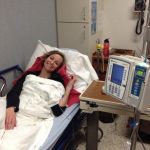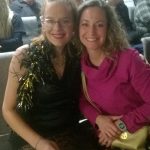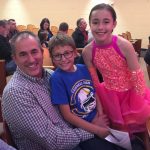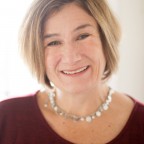Name: Shelley Ramsey DeJongh
Age: 43
Location: Wisconsin
Recovery Date: December 20, 2014
Recovering From: Alcohol, Opioids, Cigarettes
About Shelley: I am married to Dave, and mom to Addyson (11) and Bryce (9). I am a mental health and drug and alcohol counselor. I provide online therapy through my private practice. In 2018, I was diagnosed with Relapse Remitting Multiple Sclerosis and have changed the direction of my work to providing counseling services to people with chronic illnesses and possibly mental health and addiction issues secondary. Besides work and sports for my children, I love to travel, read, scrapbook, advocate on social media, perennial flower garden, camp and sleep.
Q. Before you entered recovery, what did you think the “thing” you were addicted to gave you, did for you, etc.?
A. I come from a long line of addicts and alcoholics; however, many people, including myself, believed that I would be the one to keep alcohol at a respectable distance. I never took pain pills when I had surgeries and hid my smoking. After having my son, postpartum set in and I started drinking more wine to cope. I was a counselor and did not recognize the signs within me. One bottle turned to almost two a few times a week and then I was drinking and hiding vodka over a 4.5 year period. Only my husband knew what was happening. Alcohol gave me shame and the pain pills, which were not until the last year of my using, gave me courage to get stuff done.
Q. Now that you are in recovery, what have you learned about that “thing?”
A. I learned that I really don’t like drinking. It always made me tired and I would binge drink and go to bed. I get so much more done now. As far as the pills, I realized that I don’t honestly have the level of pain in my left foot that I was medicating. In fact, once off the pills and after lots of PT, I have not had pain in almost 4 years. It was all in my head that I needed them. I had a gallbladder surgery and a rhinoplasty in the past two years and did not take opioids afterwards. I toughed it out. I don’t miss smoking either. I do not need substances and I feel SO much better because of it.
Q. How are you recovering (e.g., 12-step program, rehab, counseling, on your own, etc.)?
A. I had A LOT lot of shame from my using behaviors. Before treatment, I quit my job- my life actually and went away for almost 40 days. When I left treatment, they told my husband I would relapse if I didn’t do at least 3 meetings a week. I would have to drive at least 30 minutes to attend one and I knew that anywhere I went I would likely see past clients. Honestly, meetings and I have a love/ hate relationship and I knew if I went to one I would relapse. Instead, since I was unemployed, I volunteered at my children’s school. I read Jesus Calling daily and I prayed a lot. I stayed clean and sober at first for my kids and then me. We are all different in our needs, but I was fairly private about my recovery due to shame.
Q. In recovery, how do you give yourself what you thought that “thing” provided?
A. I give myself grace. I found grace from people over the four years I have been clean and sober that I didn’t know even cared for me. I love myself and let myself be loved by God and family and friends.
Q. What was your “rock bottom” or “breaking point” when you realized you needed to change?
A. My rock bottom had many facets to it, but when my behaviors were no longer mine, they were the addicted woman in my body, I couldn’t stand it. I hated her and I saw my husband and children looking at her with disgust. I would not be around if I continued to use. I would love be imprisoned or dead. It was a deep secret and it needed to be exposed if I wanted to live.
Q. What has been the hardest part of recovery so far?
A. Recovery has genuinely not been hard for me. I would not leave treatment until I was fully into my recovery. I had a very deep night in which I said to my soul that I would not be a dry drunk, bitter, resentful, defensive, blaming or dishonest within my sobriety and if I could not work through that with my higher power than I didn’t want to live. I felt an amazing amount of peace and serenity when I was discharged. Scared shitless, but at peace being clean and sober. People did not believe in me for the first 6 months to a year and that was hurtful, but this was my journey and not theirs.
Q. What about recovery has been easier than you had anticipated?
A. Being around people who drink and being at families homes where I know they have opioids. I don’t sweat or panic. I am not interested in the high like I used to be. In fact, I used that in the beginning- look through the drink and not around it. If I envisioned myself drinking while we were out, I knew I wouldn’t stop and then there are so many consequences and I was done dealing with consequences.
Q. What has helped you the most in recovery?
A. Loving myself. Believing I deserve to feel everything in life I have been hurting over without needing to numb my emotions. My relationship with my higher power has been a daily saving grace and my children. I look at them daily and feel so blessed to be sober when I am in their presence. Finally, my husband has been my rock. Even with that said, he was codependent the first 2.5 year of my sobriety and I was not sure we would make it. We have newer problems now with my diagnosis of MS, but nothing we can’t work out in counseling.
Q. Who has helped you the most in recovery?
A. God. Hands down, for so many reason. My higher power is what allowed me to feel grace, peace, serenity and no longer ashamed of who I was.
Q. What has been the biggest surprise about recovery?
A. I have been surprised by my inability to feel like I can connect to clients who are using. I used to be able to sit session after session and hear why they use, give UA’s, call their PO, watch their families cry, listen to their lies, etc. and now, I want to share with them how amazing recovery is to be part of and I want to shake them silly. I have been trying to figure out where I am meant to be in my career and it is not to do direct AODA counseling anymore. I am meant to be with people in sobriety. It may be my MS and the fatigue- I might not have the same fight in me, but there are other counselors meant to work the front line like I used to. For now, I am meant to be elsewhere.
Q. What role has family played in your recovery?
A. My husband and children have been amazing. We went to counseling for a long time and healed together as a family. We still talk about my addiction and how blessed we are that we were committed to making our family healthy. My extended family was really good to me, but they are also part of the dysfunctional (but fun and loving) family system that I grew up in and we have had our own battles to address over the years. I have lead by example in my sobriety and as result, people believe they can have that too. My older sister will be 3 years sober in July. We have become close as we can talk the same recovery language.
Q. Knowing what you do now, what would you tell your pre-recovery self about recovery?
A. I would tell her I love her enough to see her healthy- mentally, physically, spiritually and emotionally. I would tell her that being genuinely honest in all areas of her life is so liberating and the shame will melt away once she did so. I would tell her that being around substances is not as scary, nor does she need to justify her sobriety to people. I would tell her she is beautiful and her story will have meaning one day when she is ready to share.
Q. What would you say to someone who is thinking about recovery?
A. I would tell them I care for them enough to want to see them explore recovery and find a life in it, regardless of their addiction. I have already had this opportunity and I share with them the grace they can find in life after our addiction. I have told them about post acute withdrawal and why have support- AA/ NA, family, higher power, etc is CRUCIAL to staying in recovery until we can authentically believe we deserve it ourselves. I would tell them they are loved.
Q. If there is anything else you want to add, please do …
A. Entering into recovery is a commitment. I have many clients come to me because they know they need to be clean or sober or not exposing themselves or not binging or purging, but their heart and mind is not there yet. They no show, cancel and relapse. They feel shame and spiral downward again. I think we need to be honest with our addiction. We need to say that we are not ready to make the deep heartfelt commitment we need to make to give up what we treasure- what we use to cope. When we get honest, we still have so many consequences that we will face, but we lie less, we are not as sneaky and so on. It is not easy hearing this, but I think we owe it to the people we love to say, I am not ready to stop using. I knew in saying that, I was also risking losing everything. However, when I was ready, I had not burnt all my bridges. Again, the beauty of recovery is it is our own journey. We can make it as ugly or a peaceful as we want to. At this time in my life, even with MS, I love too many people to make my recovery ugly, bitter and resentful. I choose joy.






